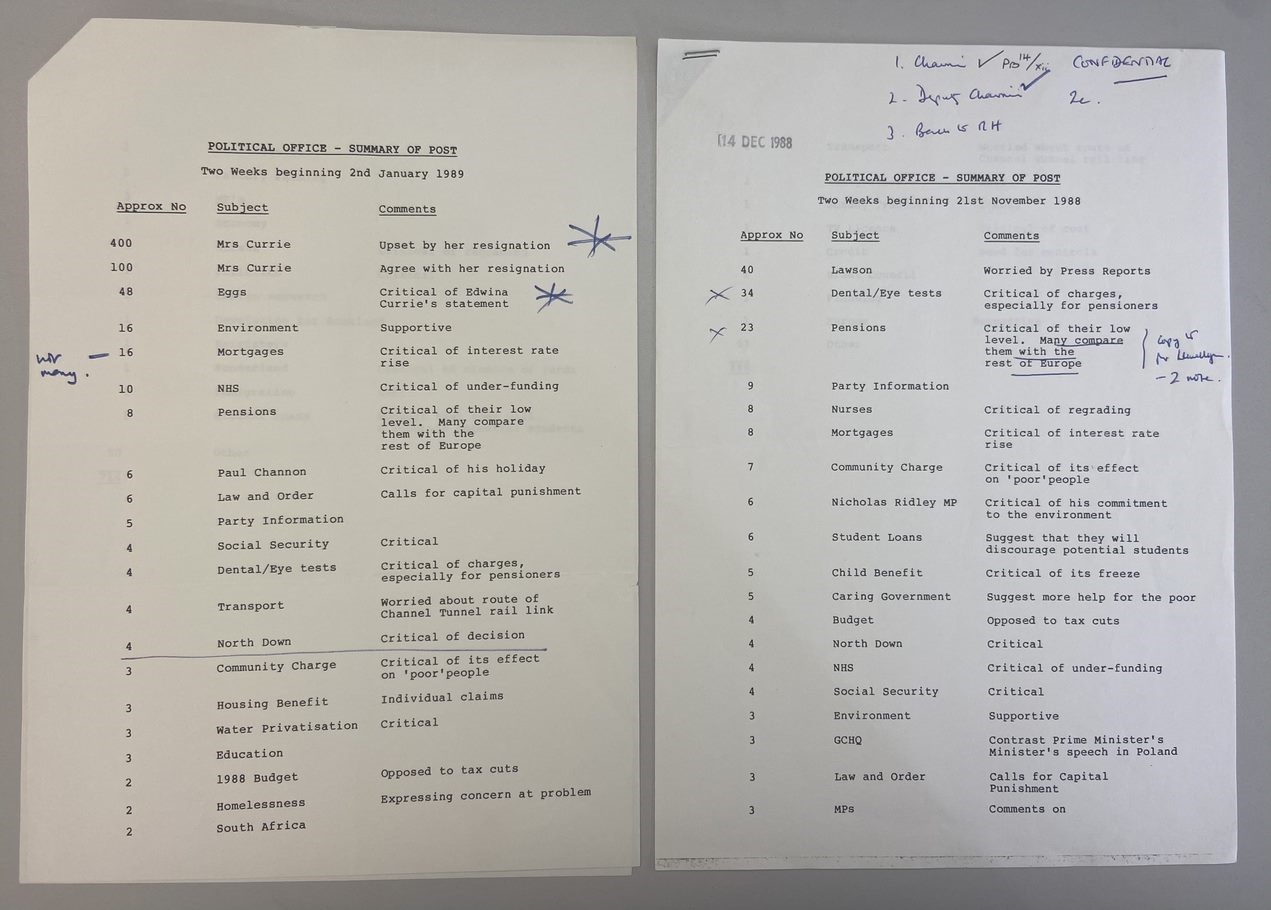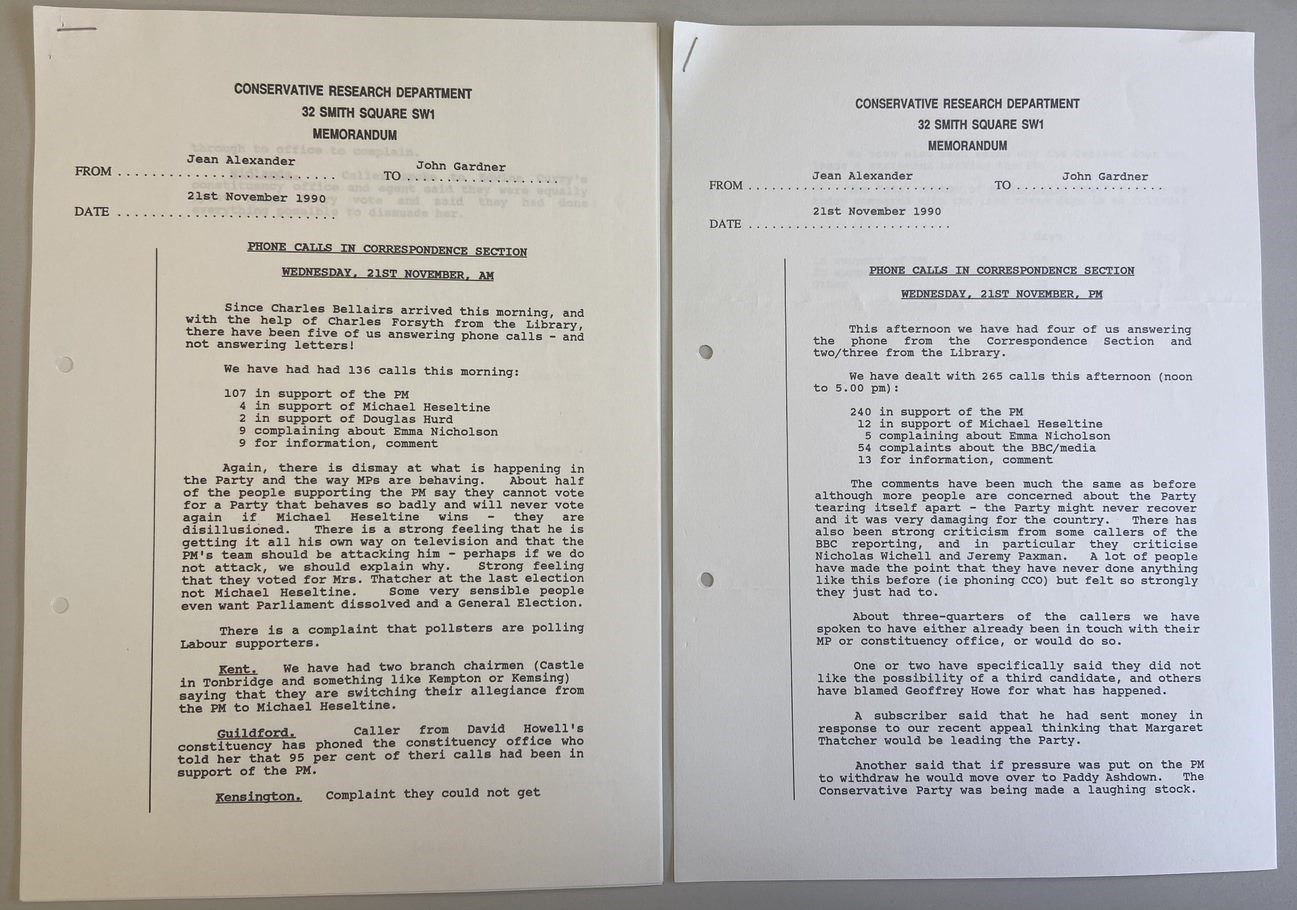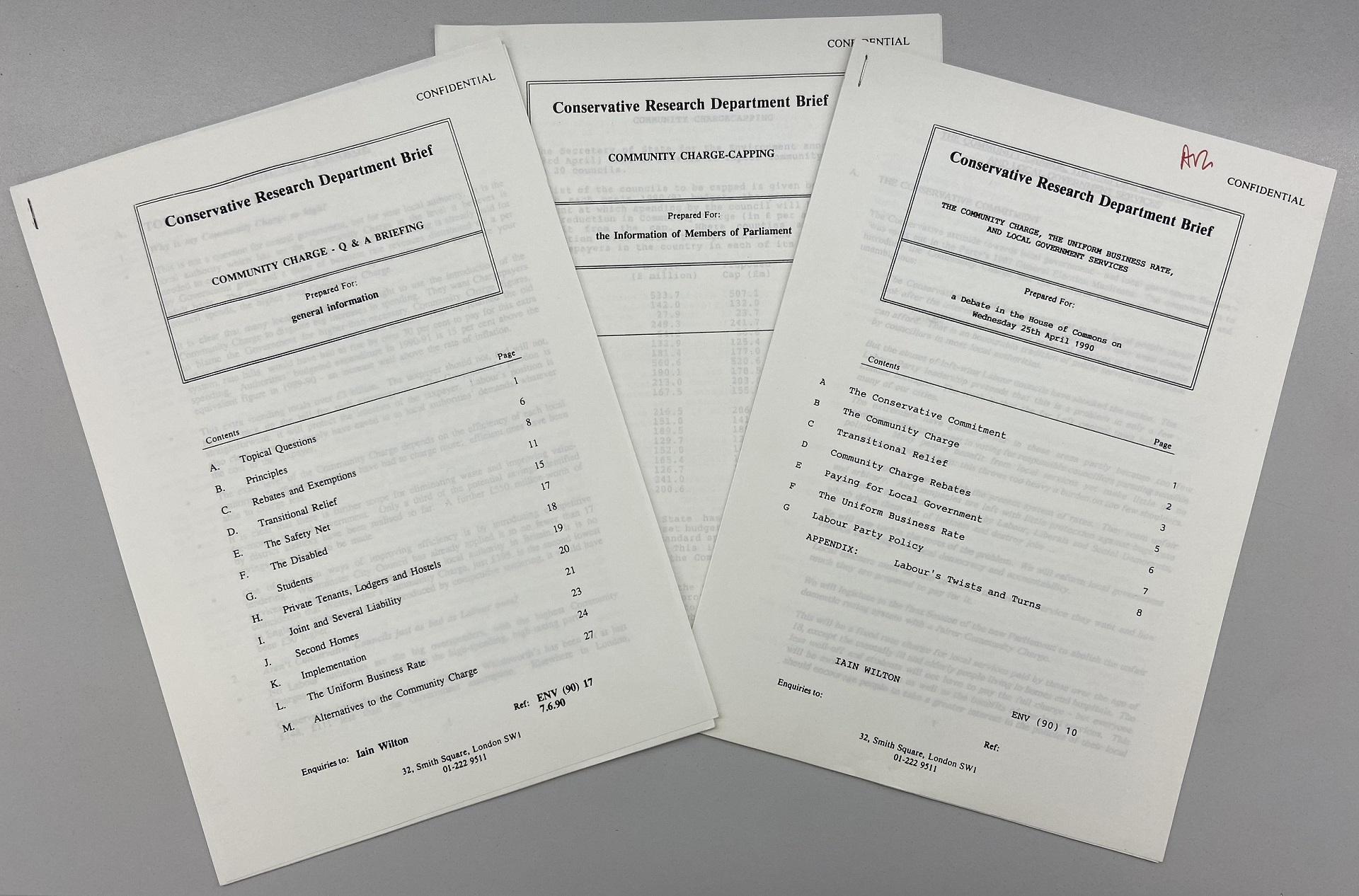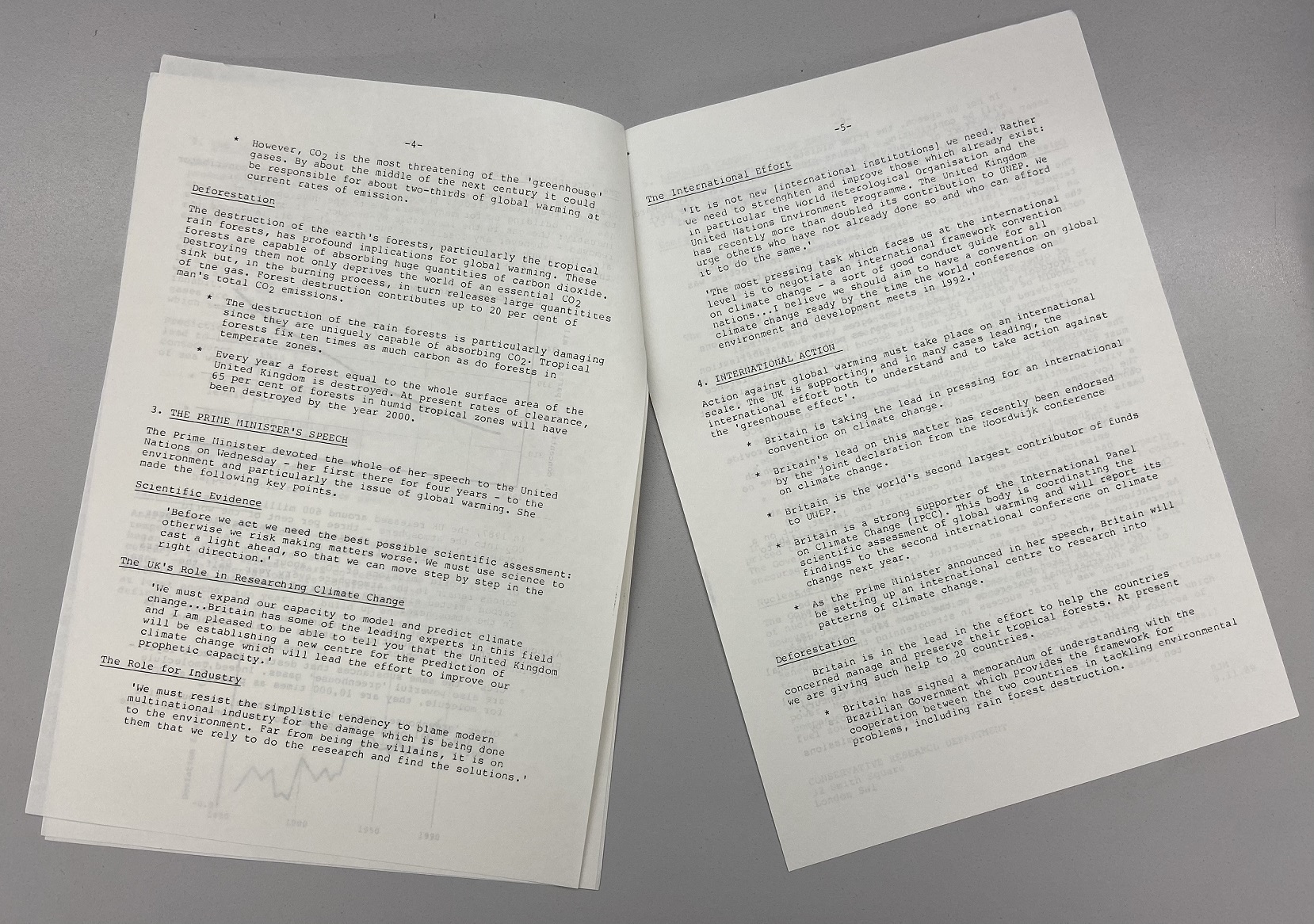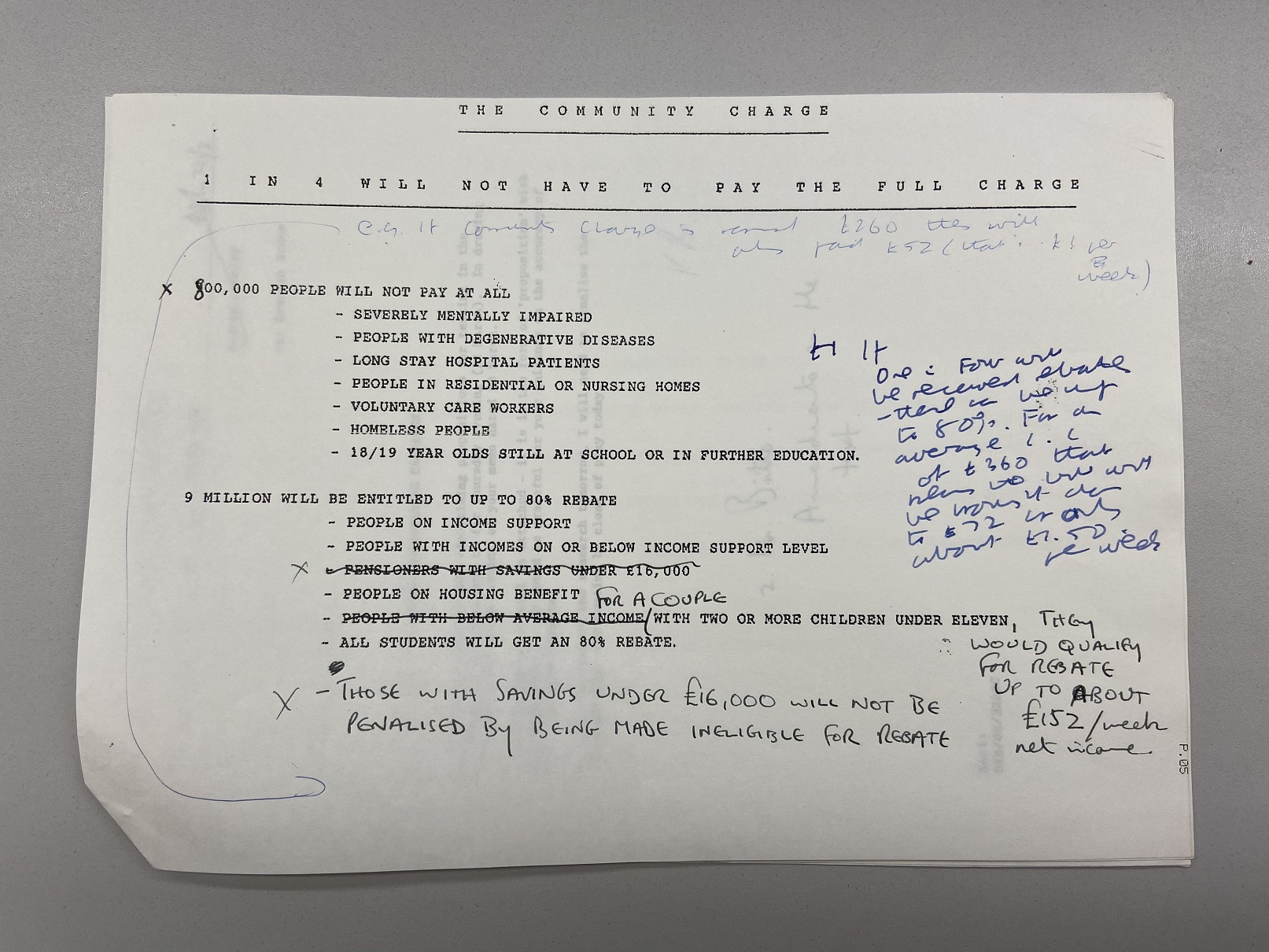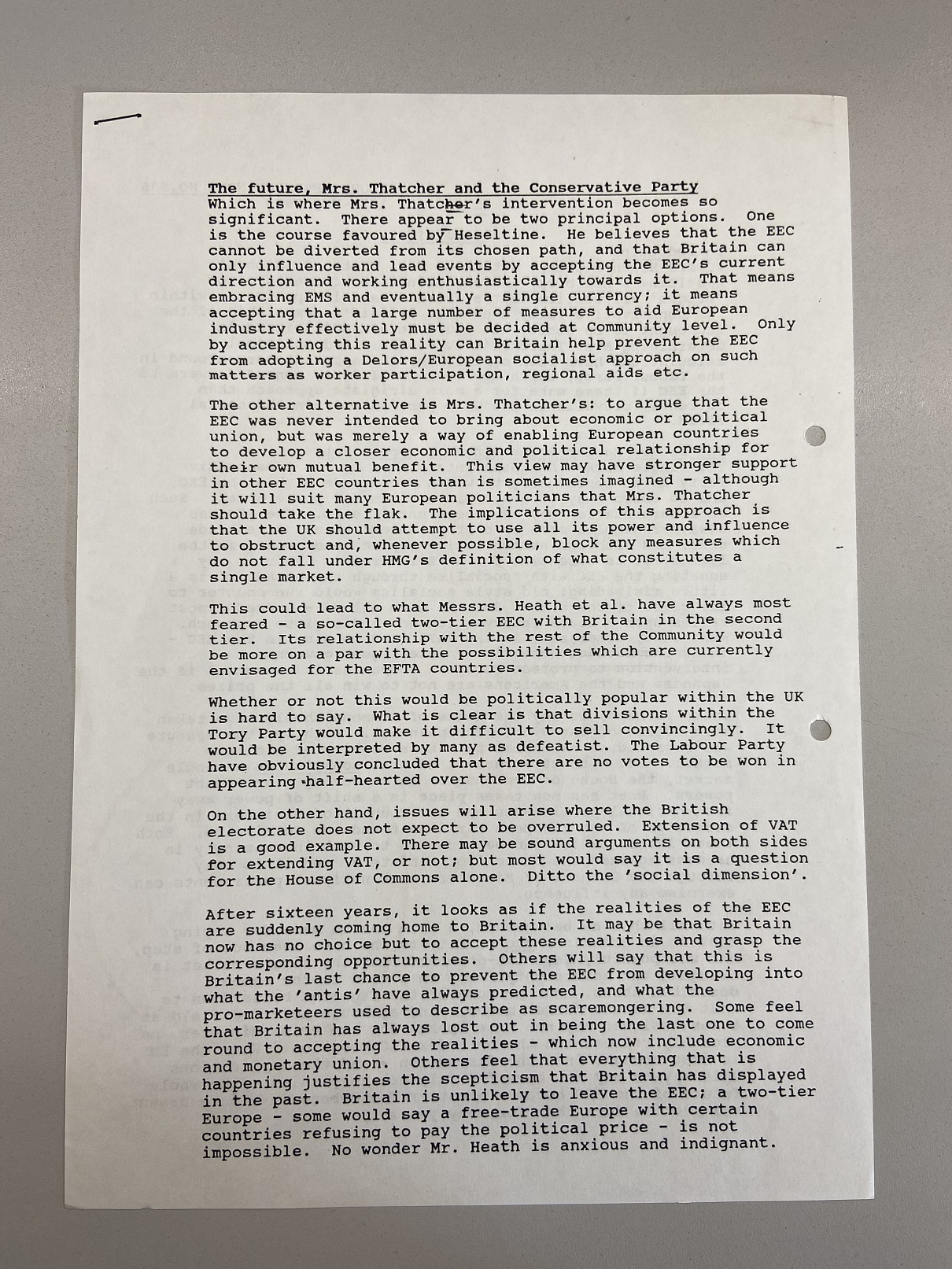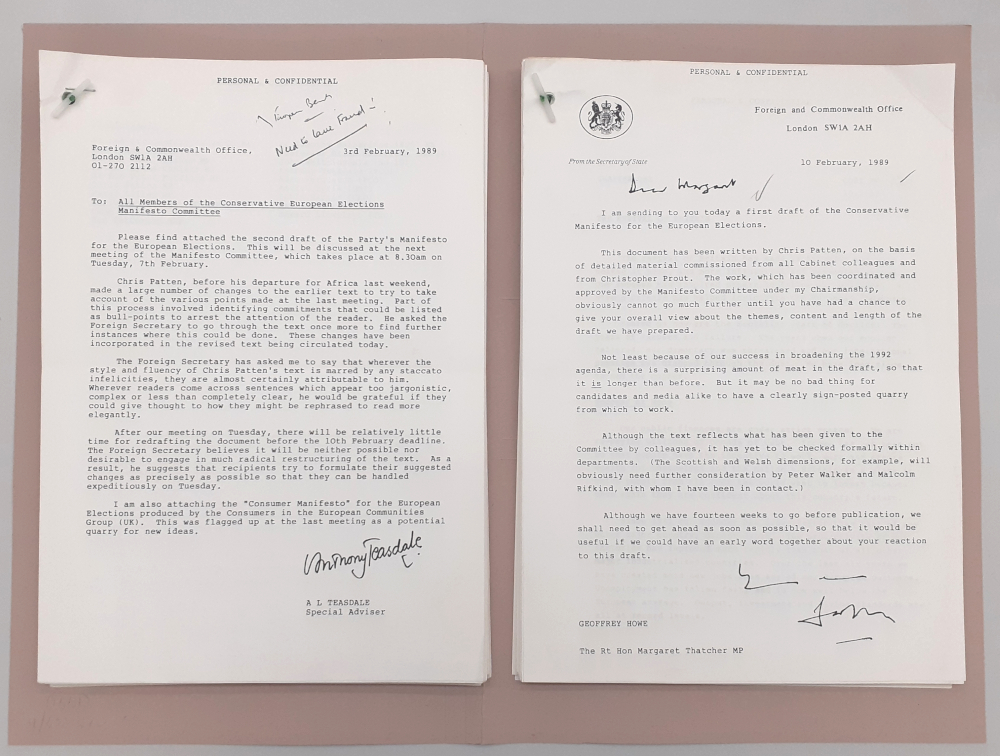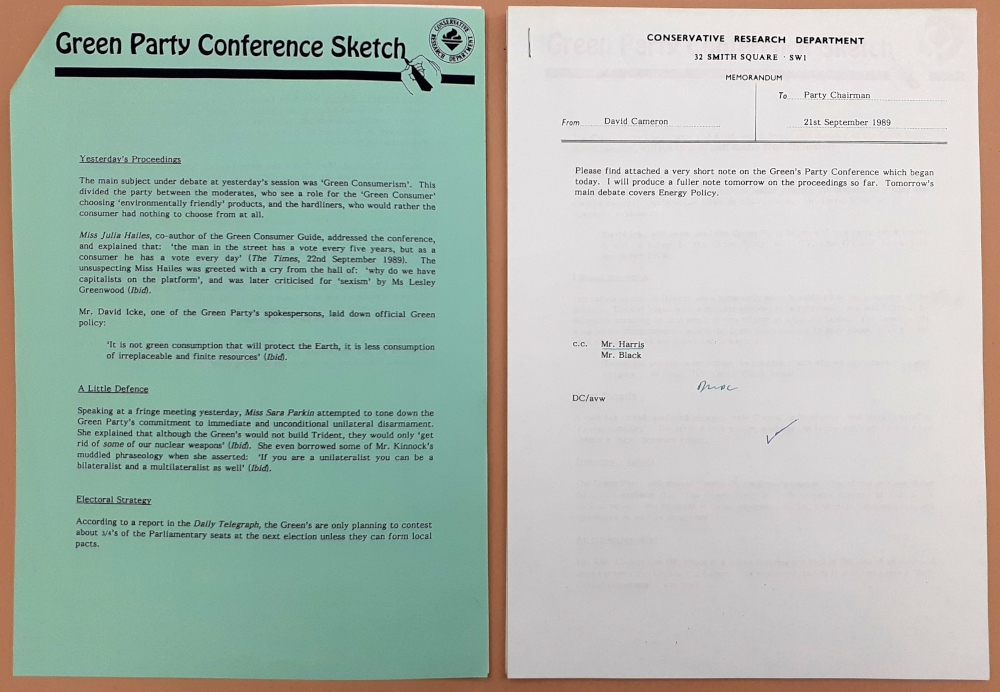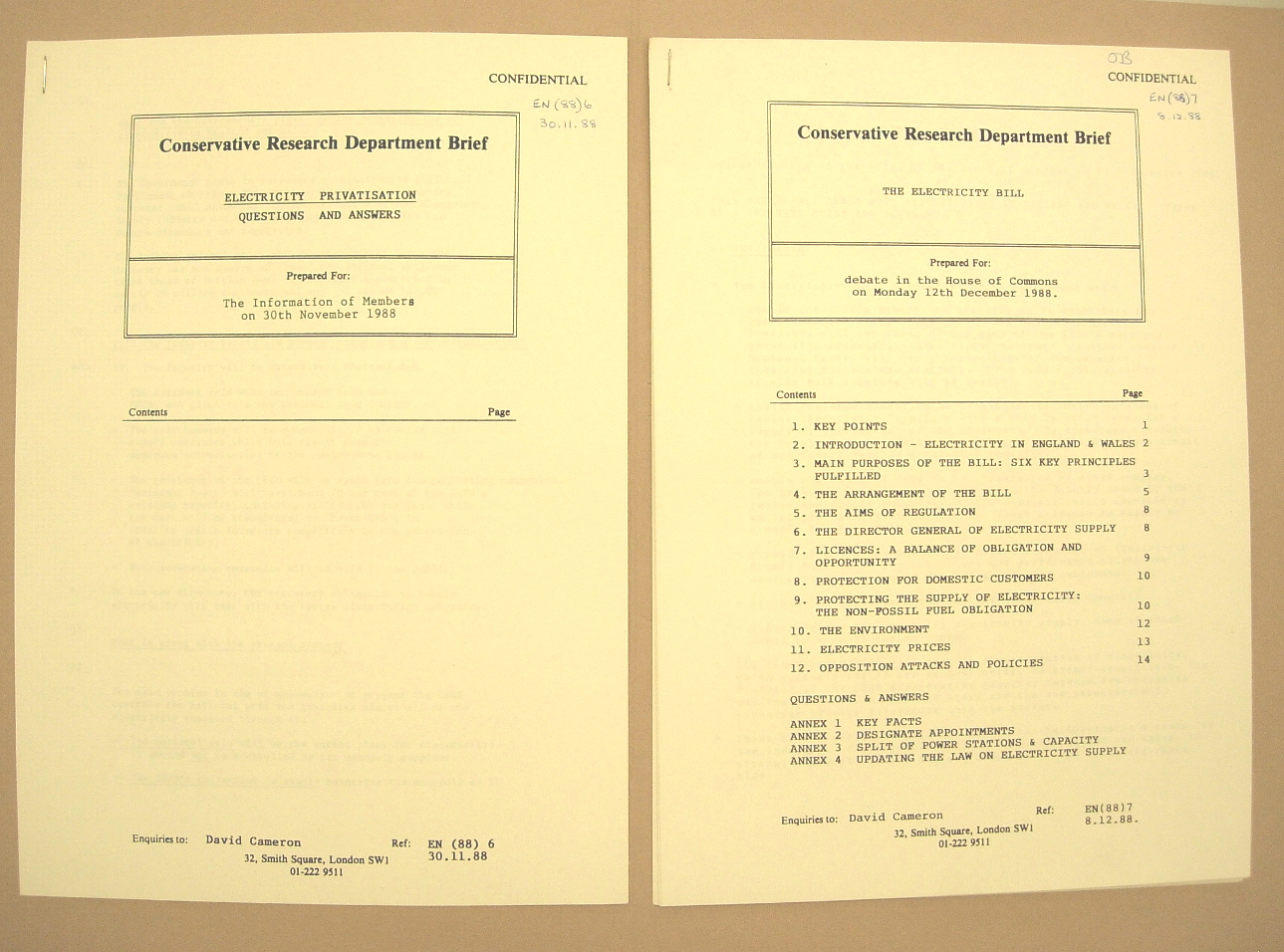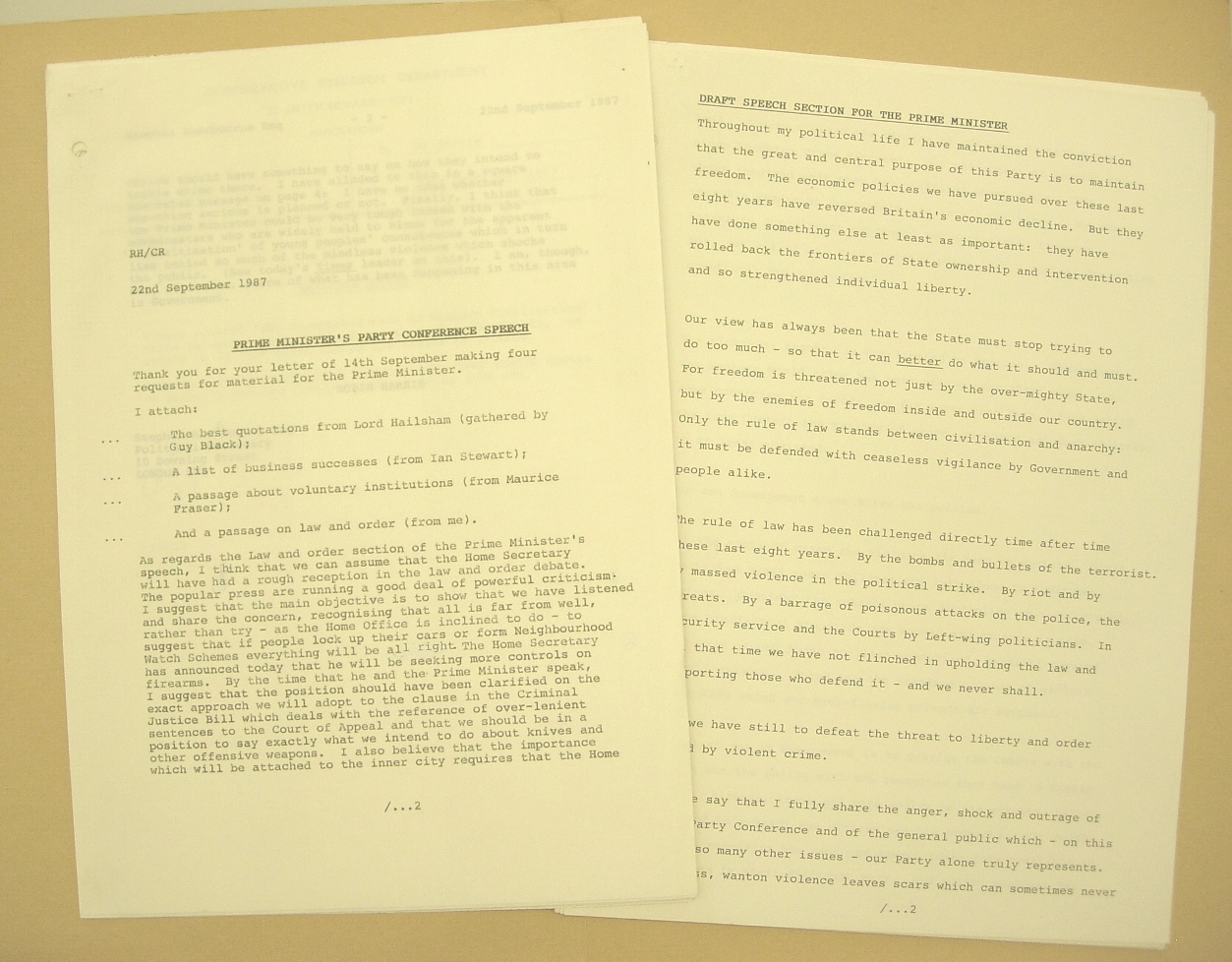Each January the Archive of the Conservative Party releases files previously closed under the 30-year rule. The majority of newly-available files this year include research, correspondence, briefs and reports created in the lead-up to the 1992 General Election. It has been just over thirty years since John Major’s somewhat surprising election victory, allowing us to open up files offering a unique insight into the behind the scenes work contributing to this win. These include subject files and briefs prepared by Conservative Research Department, campaign documents created by Conservative Central Office, and reports collected by the Public Opinion Research Department, each with significant historical value. Additional newly-released material this year includes Conservative Research Department letter books, files created by the Conservative Overseas Bureau/International Office, and papers and correspondence of Conservatives in the European Parliament.
This blog post will explore a number of highlights of the newly-released material, specifically focussing on files relating to the 1992 General Election. A full list of the newly de-restricted items is linked at the end of the post.
General Election Warbook, Mar 1992
The Conservative Party’s Organisation Department, the largest component of Conservative Central Office, underwent a significant number of structural and organisational changes throughout its lifetime, becoming known as the Campaigning Department from 1989. The Department oversaw campaigning, training, community affairs, and local government, many of their records therefore offering an insight into election planning. Being released this year is a final draft copy of Conservative Central Office’s General Election ‘Warbook’, a document prepared for John Major outlining campaign plans for the election (see file CCO 500/24/309/2). The purpose of the document, as stated in its introduction, ‘is to outline the political scenario in which the next Election will be fought and to provide the detailed guidelines and direction within which a successful campaign can be waged.’ The document is divided into sections on the ‘battleground’ and the ‘campaign’, covering issues such as target groups and floating voters, election timing, and the role of the Prime Minister in the campaign.
Below is an example of a couple of pages from the battleground section of the document, highlighting some of the key political issues of the time in the UK. Inevitably, the economy comes first. The country was still in the midst of a recession that had begun under Thatcher’s leadership, with high unemployment a particular worry. Throughout these pages there is a clear focus on ‘psychological’ impacts of certain issues, including the ‘psychological turning point’ of inflation in the UK falling below that of Germany, and the ‘psychological 2.5 million barrier’ in unemployment figures. It is evident that this election campaign was highly focussed on the way the general public perceived economic changes. Further issues explored in later pages include the NHS, Europe, crime and education.
A later section of the document focusses on target groups and communications during the campaign. It highlights the importance of media in reaching target audiences, stating ‘the objective must be to saturate the media with the Party’s campaign. If the Party reaches the media then the Party’s target groups among the electorate will also be reached.’ Some of these target groups, those typically considered floating voters or who current messaging was failing to reach, included the 30-45 age group, and upper working-class men. The importance of John Major as Party Leader is also discussed here, the document emphasising that ‘the Election Campaign will be more presidential in its style and manner than hitherto experienced.’
Inside Conservative Research Department, Mar-Apr 1992
Conservative Research Department also played a fundamental role in preparations for the election, acting as an essential source of facts and figures for key party members and MPs during the campaign. During the build-up to the 1992 General Election, David Cameron was Head of the Political Section of the Research Department, playing an integral role in these preparations. Amongst the new releases for this year are a couple of his letter books, as well as letters and briefs created by him amongst the letter books of desk officers who worked under his leadership.
The memoranda pictured below, sent out by Cameron in successive days in the week before Labour released their Shadow Budget, illustrate the inner workings of the Research Department at this time. Cameron stresses the importance of making sure ‘we destroy, comprehensively, Labour’s Shadow Budget on Tuesday’, highlighting the need to find any ‘technical slip ups’ and to brief selected journalists with specific topics and questions that might be particularly harmful to the opposition. This period was obviously one of the busiest for those employed in this department, with specific focus on anticipating the moves and policies of other parties in order to effectively tackle them.

David Cameron Letter Book: Political Section (General Election briefing material), Mar 1992 – CPA CRD/L/5/6/14.
The same letter book also contains a document looking back on the work of Conservative Research Department during the campaign. In addition to leading the Political Section of the Research Department, Cameron was responsible for briefing John Major for his press conferences throughout the election campaign, contributing to the very early mornings demonstrated by this timetable. This was perhaps too much to take on, as he reflects: ‘It was a mistake for the job of briefing the Prime Minster to be given to the Head of the Political Section. I should have concentrated solely on monitoring and responding to the statements and activities of the Labour and Liberal parties. It was quite difficult to combine both jobs and do them properly.’ Other reflections include the fact that the Economic Section were ‘persistent offenders’ in being late to submit briefs, and that opposition monitoring had been a particularly successful aspect of the campaign.

David Cameron Letter Book: Political Section (General Election briefing material), Apr 1992 – CPA CRD/L/5/6/14.
Defence, 1990-1992
The issue of defence was an area in which the Conservative Party particularly sought to distance their policies from those of their opposition, emphasising their approach as the only one able to keep the country safe. A newly-released subject file on defence (COB 8/5/2 Folder 5) contains briefings and memoranda relating to the Saatchi and Saatchi Party Election Broadcast on defence. The file demonstrates the gradual process involved in creating such broadcasts, with various annotated drafts illustrating how phrasing and structure was altered. The image below shows Guy Rowlands, Conservative Research Department defence desk officer, emphasising the need to remove the naming of the Ayatollahs as ‘villains’, as this inclusion was ‘just too sensitive and would spark problems’.
This file also contains papers relating to a plan of ‘teasing out some damaging nuggets from the Labour hierarchy by way of inspired correspondence.’ The plan involved finding members of the public, identified by constituency agents, willing to send letters to opposition MPs such as John Prescott, Gerald Kaufman and Joan Ruddock, to help the Party learn more about Labour’s defence policy and even encourage admissions such as ‘their life-long support for CND’, the Campaign for Nuclear Disarmament. In a letter to the Oldham West Conservative Association, Rowlands offers recommendations for such correspondence, suggesting ‘perhaps the letter-writer could pretend to be full of concern for nuclear proliferation and argue that the world needs organisations like CND more than ever before…!’ This was certainly an interesting tactic but may well have contributed in some small way to the Party’s election victory.
All the material featured in this blog post will be made available from 3 Jan 2023. The full list of de-restricted items can be accessed here: Files de-restricted on 2023-01-03









